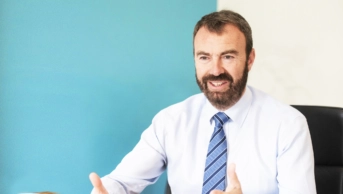
Dave Phillips
In the heart of Manchester’s old conservation area, Well Pharmacy’s head office sits in a red-brick converted warehouse next to the canal. But it is no relic of the industrial revolution. Well Pharmacy is a relatively young company, formed — from the remnants of the Co-operative Pharmacy chain — in 2015. And the man responsible for bringing the third largest pharmacy chain in the UK up to date is John Nuttall.
He understands the sector well, having qualified as a pharmacist in 1985 and spending six years in a customer-facing pharmacy role. Eighteen years ago, Nuttall became retail operations director for United Co-operatives, and two years later he took up his first managing director role at the Co-operative Group. He took over as chief executive of Bestway in 2014, which then became Well Pharmacy a year later.
Nuttall speaks to The Pharmaceutical Journal as the damage from the cuts to community pharmacy funding eat into multiples’ bottom lines, with Lloyds closing down almost 200 stores, and online pharmacy insurgents try to seize market share.
But he seems remarkably relaxed, sitting on a comfortable chair in his office and answering all the questions put to him by The Pharmaceutical Journal with candour.
What makes Well Pharmacy different to other multiples?
Our independence is important. Previously, we were part of a big organisation. Our new owners have given us the freedom to shape how we drive the business forward. We can say: where do we think the market’s going? Where do we think pharmacy’s going? And how can we drive the strategy and agenda that we think fits?
We don’t have the constraints that some multiples have, and we don’t have some of the limitations that some independents have
That makes us a bit different: we don’t have the constraints that some multiples have, and we don’t have some of the limitations that some independents have. We’re in a good place.
It’s certainly the ambition of our owners that we grow the business, and I think it’s really important for our colleagues to understand that too.
Some multiples have closed branches recently. Is Well expanding or contracting its footprint?
Our strategy is that we will, as far as we can, hold the stores we have. We are committed to keeping those that are of a marginal level of profitability. Pharmacy’s going through quite a big shake-up; there are different strategies out there and you might say, “let’s consolidate quick and take the cost savings”, but we like to play the long game.
Will we have to close stores? Well, in any portfolio you always have one or two stores where, for example, the local GP moved away. But there’s no strategic initiative to reduce the size of the footprint of the business — conversely, we want to expand. But not necessarily through bricks and mortar.
We were quite keen to talk to LloydsPharmacy about purchasing some stores that they are closing, but for some reason they didn’t want to talk to us. We tried. My impression was that they had advance discussions with a number of people before going on the market, but I’m speculating.
How is Well’s prescription ordering app going?
Fantastic. I’m one of the first customers! I was impressed by the end-to-end process. For us, digital is the route through which we want to fulfil a different way of working for customers. Our research very clearly tells us that customers want to transact with pharmacy in a number of different ways. Some people choose to go to bricks and mortar, but many people want to transact online. Our theory is that if we give customers a very slick, end-to-end online service, that they will choose us over our competitors.
Our theory is that if we give customers a very slick, end-to-end online service, that they will choose us over our competitors
We are planning on rolling the app out nationwide. As with any digital IT project, it’s difficult to pin a date down but before the end of the calendar year we would like to have gone national with this. We’ve got the pharmacy licence for our warehouse in Stoke and we’ve built some capability there for hub-and-spoke dispensing, but we’re now building on that for the digital offer as well.
Are you concerned that some clinical commissioning groups want to limit online ordering?
It’s important to understand that we’re not ordering the prescriptions from the GP, the patient is: they have nominated us to act on their behalf through this portal. It’s very clear to the doctor’s surgery that this is a request on behalf of the patient. That is important because as this part of the sector grows it could become increasingly tense, I think, between bricks and mortar and digital operators.
Are internet pharmacies a threat to bricks and mortar?
I might be wrong on the exact numbers here, but I believe that less than 0.5% of prescriptions are transacted online. If you look at general retail, it’s nearer 10% and in banking, it’s even higher. I think there’s plenty of business to go round.
Am I worried? A certain online company does have fairly aggressive marketing campaigns. I guess I would point to some of the customer reviews for that company and say, what’s the customer experience like? Ultimately, I think that’s what will determine where customers go. If they get a great service from their local pharmacy, fine; if they choose to go online because it’s more convenient for them, then that’s also fine.
How ready are you for the Falsified Medicines Directive?
When we built our warehouse in 2008 we implemented batch control, which was a first step towards adhering to the Falsified Medicines Directive (FMD). We did it because we thought regulation may go in that direction. Then we turned it off because it was expensive to run. So we can turn that back on — of course I’m oversimplifying it, but the warehouse end of things will be key.
Although, in my view, the FMD is a sledgehammer to crack a nut. We’ve got falsified medicines in the marketplace and that’s harmful and serious, but must we apply a solution to every product? Even generics worth 15p? Is there really a market for falsified medicines that cost 15p? Why are we applying this solution to everything?
The policymakers and the people who represent pharmacy are not good at translating policy into front-end operation. If you know what it’s like to work in a pharmacy, you’d be better able to represent us and ask: “What does the FMD mean for our front-end pharmacists?”
We’ve got no immediate plans to train staff on the FMD. We will respond as it becomes clearer what the defined timetable is — right now we wouldn’t have anything to train them on.
How do you monitor staff wellbeing?
It’s an open organisation and we encourage our colleagues to give us feedback. We’ve got helplines and we do an annual employee engagement survey and another small sample halfway through the year. This helps us identify, even down to individual store level, if there is pressure and stress. Then we can respond as a business, whether that’s giving more support or, if we’ve got a manager who’s really struggling in a particular location, saying, “here’s a quieter store”.
That’s the first route to wellbeing. The second really important thing we’re trying to do is take work away from the pharmacy and put it into the centre: the hub and spoke model.
In some stores it’s working really well and the pharmacists can see the very clear benefits of taking work away and giving them time to do other things
I have to say hub and spoke’s been more bumpy than I would have liked. The pharmacy end is a bit clunky for us, and we need to look at our PMR system providers and ask: “Is there an easier way for us to deliver the front end?” By the end of October 2018, we hope to have the revised solution in place. At the moment we’ve got it in 60 stores and the intention is to roll that out to every store so we’ve got one operating platform across the business.
In some stores it’s working really well and the pharmacists can see the very clear benefits of taking work away and giving them time to do other things: to focus on being a pharmacist and not a supply and assembly person.

Source: Dave Phillips
Nuttall believes that utilisation of digital technology saves pharmacists’ time, leading to better face-to-face interactions
By ‘focus on being a pharmacist’, do you mean the clinical aspect of the role?
Yes. We have to believe that, somewhere in government, people think our profession adds value and that the clinical aspects of the pharmacy role are important. While at the moment that’s translated into some local services, we haven’t — disappointingly — got the minor ailments agenda that I’ve been talking about for years. It’s done locally but it’s not commissioned nationally, and I think that’s a big miss.
The key is taking the work away. Look at the current debate between the Pharmaceutical Services Negotiating Committee (PSNC) and the government around whether we want to move from the profit-on-purchasing contract to a service contract. That might sound great, but the work’s not going to go away. The supply work is still there and it’s growing year on year. You’ve got pharmacies who’ve doubled their volume of prescriptions dispensed in the past 10–15 years. I think there’s a real challenge here to say: “How do we invest in services and still deliver the essential supply element of our role?”
You’ve talked about embedding the digital experience in bricks-and-mortar pharmacies: what does that involve?
You can’t run digital entirely separately from bricks and mortar: integrating them is really important. You can signpost, in stores, to the digital services, and you can have bricks and mortar as a collection point for products or service interventions. You could go online and say, “I want to book a consultation with a pharmacist about X”, be signposted to a physical location and have a meaningful face-to-face interaction there.
Bricks and mortar is really important to us — the vast majority of people still go to a pharmacy and most people prefer a face-to-face interaction
Bricks and mortar is really important to us — the vast majority of people still go to a pharmacy and most people prefer a face-to-face interaction. But our philosophy is about making that face-to-face interaction even better than it is today by taking the work away and giving the pharmacist time.
What’s your message to policymakers?
We need time with policymakers to talk meaningfully about the future. Pharmacy’s driven itself into a place that is uncomfortable both for pharmacy and for the government. This brinkmanship around funding and the High Court has not been helpful in creating a dialogue. The world is changing: technology gives us the capability to do things differently and the government has said, very clearly, that pharmacy should embrace that.
Some pharmacists pretend the world isn’t changing and that things will always be how they’ve been. We need say to the government: we get where you’re coming from. But the government must play its part and say, “let’s create a route to changing pharmacy”, because the behaviours at the moment mean that we end up in conflict.
I’ve always been of the view that the PSNC has not delivered for pharmacy
It was very regrettable that the funding decision was taken. Now we need to stop and reflect. Pharmacy’s done well in the past and it’s been a successful sector. The government has done really well out of pharmacy, too: we’ve brought down drug pricing in this country substantially over the past 10–15 years. It would be great if everyone could get in a room and talk.
Simon Dukes, the new chief executive of the PSNC, is a very impressive individual. I’m hopeful that he will take the sector forward. I’ve always been of the view that the PSNC has not delivered for pharmacy, for many reasons: both internal and within the sector. I’m hopeful that with new leadership we’ll get a stronger future.
What advice would you give a newly qualified pharmacist?
The future is in your hands. Pharmacy is still a proud profession. When I qualified things were very different; I’d like to bring back some of the pride that was around 30 years ago. We’ve got some really skilled people coming out of university — I hope that the policymakers will enable those skills to be utilised, because they are under-utilised currently. Some of the rhetoric we’ve seen from government is not fair on pharmacists who’ve invested five years in qualifying. They’re really bright people: let the stars align so they can use their skills.


